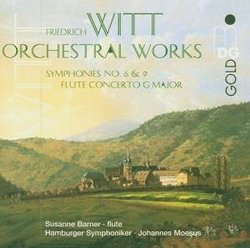| All Artists: Friedrich [Composer] Witt, Johannes Moesus, Hamburg Symphony Orchestra Title: Witt: Orchestral Works Members Wishing: 0 Total Copies: 0 Label: MD&G Records Release Date: 7/26/2005 Genre: Classical Styles: Forms & Genres, Concertos, Historical Periods, Baroque (c.1600-1750), Instruments, Reeds & Winds, Symphonies Number of Discs: 1 SwapaCD Credits: 1 UPC: 760623129921 |
Search - Friedrich [Composer] Witt, Johannes Moesus, Hamburg Symphony Orchestra :: Witt: Orchestral Works
 | Friedrich [Composer] Witt, Johannes Moesus, Hamburg Symphony Orchestra Witt: Orchestral Works Genre: Classical |
Larger Image |
CD Details |
CD ReviewsOne of the best Contemporie of Mozart Serie Dr. P. Schulte | Recklinghausen, Germany | 11/24/2005 (5 out of 5 stars) "If this CD were released in the contemporie of Mozart Serie , it would be one of the very best. Friedrich Witt has the same birthyear 1770 as Beethoven, but was not such progressiv , its more in the typical classical Style of late Mozart and Haydn. The Flute Concerto is a Masterpeace , not only for the Flute- playing , the Orchestration is also masterfull ! The Symphonies have strong melodic Lines too, exspecelly his 9th symphony rages in the Style between Mozart and Beethoven with some realy superb melodic movements. If you love the better cds in the contemoporary of mozrt series or the late haydn symphonies you can`t get wrong with this , - for lovers of flute concertos its a must have !" Friedrich Witt: Beyond the Jena Symphony M. C. Passarella | Lawrenceville, GA | 05/04/2009 (5 out of 5 stars) "To music lovers, Friedrich Witt is known, if at all, for what Beethoven didn't do--write the so-called Jena Symphony. Musicologist Fritz Stein, who found the manuscript in a music library in the German city of Jena in 1909, thought he had uncovered enough evidence to convincingly attribute the work to Beethoven, but later research cleared up the mistake. If you ever hear Witt's well-behaved, Haydnesque symphony (the BBC issued a good recording by Matthias Bamert in 1995), you'll realize that only the famous name mistakenly attached to it could give it any legs at all. And while others of Witt's compositions won him praise during his lifetime, his essentially conservative musical voice guaranteed that his works would fall out of favor long before his death in 1836.
It's good to have the chance to assess other examples of Witt's music, especially ones from later in his creative life. As might be expected, the Symphony No. 6 (published in 1809) and No. 9 (published in 1819) find him treading much safer symphonic ground than Beethoven did in his symphonies from the same period. Symphony No. 6 capitalizes on the continuing Viennese craze for Turkish music. Unlike Haydn, who has the good sense in his "Military" Symphony to limit the use of the Turkish percussion instruments, Witt employs them throughout every movement except the slow movement, with the result that they lose their freshness pretty quickly. Incidentally, that slow movement, with its pizzicato strings and colorfully varied writing for the winds, is easily the most unusual and effective of the lot. But throughout, the music is tuneful and in the fast movements more mercurial than Haydn's piece, recalling for me the symphonies of Antonio Rosetti, said to be an important influence on Witt. I like Rosetti, whose works have a kind of impish restlessness to them compared to the suavity of Mozart or the iron-clad logic of Haydn (leavened, of course, by an incomparable sense of humor). So I find Witt's Turkish Symphony and the even finer Symphony No. 9 interesting and attractive as well. The Ninth Symphony is more serious, but I'm most drawn to its bouncy Minuet third movement, which is a scherzo in all but name. The Flute Concerto is attractive, too, with a beefier orchestral backdrop than Mozart provided in his Flute Concerto. Witt has confidence that the flute can make its mark vis a vis an orchestra pumped up with trumpets and drums, and the result is a hearty piece in the style of Franz Krommer. So there: I've compared Witt with Krommer, Haydn, Rosetti, and Mozart. But this is only to give his work some context. Though influenced to some extent by all of these composers, he creates his own unique sound world, as all good composers do. And as such, I think he's worth hearing. While I have nothing to compare the current performances to, I think Moesus and his Hamburg orchestra do right by Witt. There is energy and seriousness of purpose in their approach, and the orchestra plays well top to bottom. Meanwhile, the recording is beautifully refined, with good presence from most of the instruments except, curiously, the Turkish percussion, which gets a slightly backward placement. I think the Sixth Symphony would have had greater impact if they had been given their due." |
